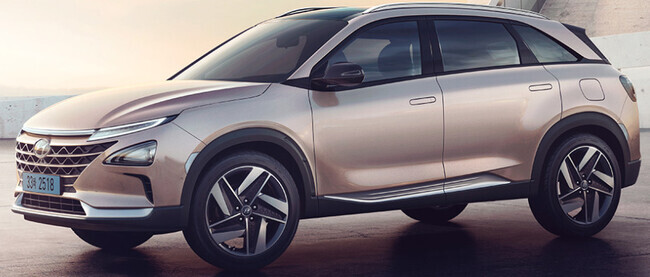Electric latecomer Toyota invests big in battery-powered vehicles
이 글자크기로 변경됩니다.
(예시) 가장 빠른 뉴스가 있고 다양한 정보, 쌍방향 소통이 숨쉬는 다음뉴스를 만나보세요. 다음뉴스는 국내외 주요이슈와 실시간 속보, 문화생활 및 다양한 분야의 뉴스를 입체적으로 전달하고 있습니다.

Automobiles are a key field for anticipating the future of the hydrogen industry. Recently, the industry has been caught in a fierce debate over which is superior: hydrogen fuel cell electric vehicles (FCEVs) or battery electric vehicles (BEVs).
Both types of electric vehicles currently being produced by the finished automobile industry use electricity to operate their motors, but they differ in where their electrical energy comes from.
With a BEV, drivers charge their battery using a charging plug on their vehicle. With an FCEV, hydrogen is placed in a tank in the vehicle, with a fuel cell serving as a sort of generator that produces electricity as it combines with oxygen in the air.
The industry debate has been escalating since Toyota Motor Corp.’s recent announcement of plans for large-scale investment in its battery sector. Toyota was the world’s second automaker to mass-produce hydrogen vehicles — Hyundai Motor having been the first.
A relatively late starter in its transition to electric vehicles, Toyota announced plans on Sept. 7 to invest 1.5 trillion yen (US$13.6 billion) through 2030 in battery research and development and facility construction, with the aim of achieving battery production upwards of 200 gigawatt-hours annually.
Honda Motor Co., the world’s third-ranked hydrogen vehicle manufacturer, recently decided to halt production of the vehicles. Its decision was seen as based on the lower profitability of hydrogen vehicles, where sales have been weak due to the steeper price tag and fuel costs when compared with EVs and the lack of charging infrastructure.
The German company Volkswagen made the move relatively early on to go all in on BEVs rather than FCEVs. In a report published in 2019, the company said that while FCEVs have numerous advantages, including fast charging times without the need to store a heavy battery, their inefficiency in terms of energy and costs was a decisive strike against them.
Not all the major finished car makers have washed their hands of hydrogen.
BMW recently showed off its iX5 Hydrogen concept car at the IAA Mobility motor show in Germany. Like Hyundai, it is pursuing a strategy of both BEV and FCEV development.
Hyundai, which ranked first in FCEV sales globally this year with 5,300 units sold between January and July, has officially adopted a two-pronged strategy of producing and selling both BEVs and FCEVs.
“In comparison with Toyota, which has said it plans for major production of hybrid vehicles with internal combustion engines through 2030 at least, Hyundai’s strategy of focusing on both BEVs and FCEVs seems more in line with the recent eco-friendly trend,” said an official with a major automaker.
By Park Jong-o, staff reporter
Please direct questions or comments to [english@hani.co.kr]
Copyright © 한겨레. 무단전재 및 재배포 금지.
- 손준성도 윤석열처럼 “국정원장 개입 의혹 수사해야”
- 삼성 갤럭시OS 무산시킨 구글, 한국서 역대급 제재 받는다
- 이재용, 가석방 뒤 ‘청년 일자리’로 첫 외부 일정…김부겸 총리 동석
- #내옷건들지마…부르카 벗은 아프간 여성들이 입은 옷은?
- ‘당 직인’ 찍힌 고발장에 침묵…국민의힘, 윤석열과 ‘선긋기’ 통할까
- 소도 화장실 간다, 기후변화 막기 위해
- 상하이서 맴도는 ‘찬투’ 17일 새벽에 제주 거쳐 남해상 통과
- 다래끼 치료하러 간 초등학생, 병원 실수로 화이자 백신 접종
- 대통령도 손가락 느리면 못 산다, ‘캐스퍼’ 1호차 주인공은 누구?
- 한가위 보름달 서울서 오후 6시59분 뜬다